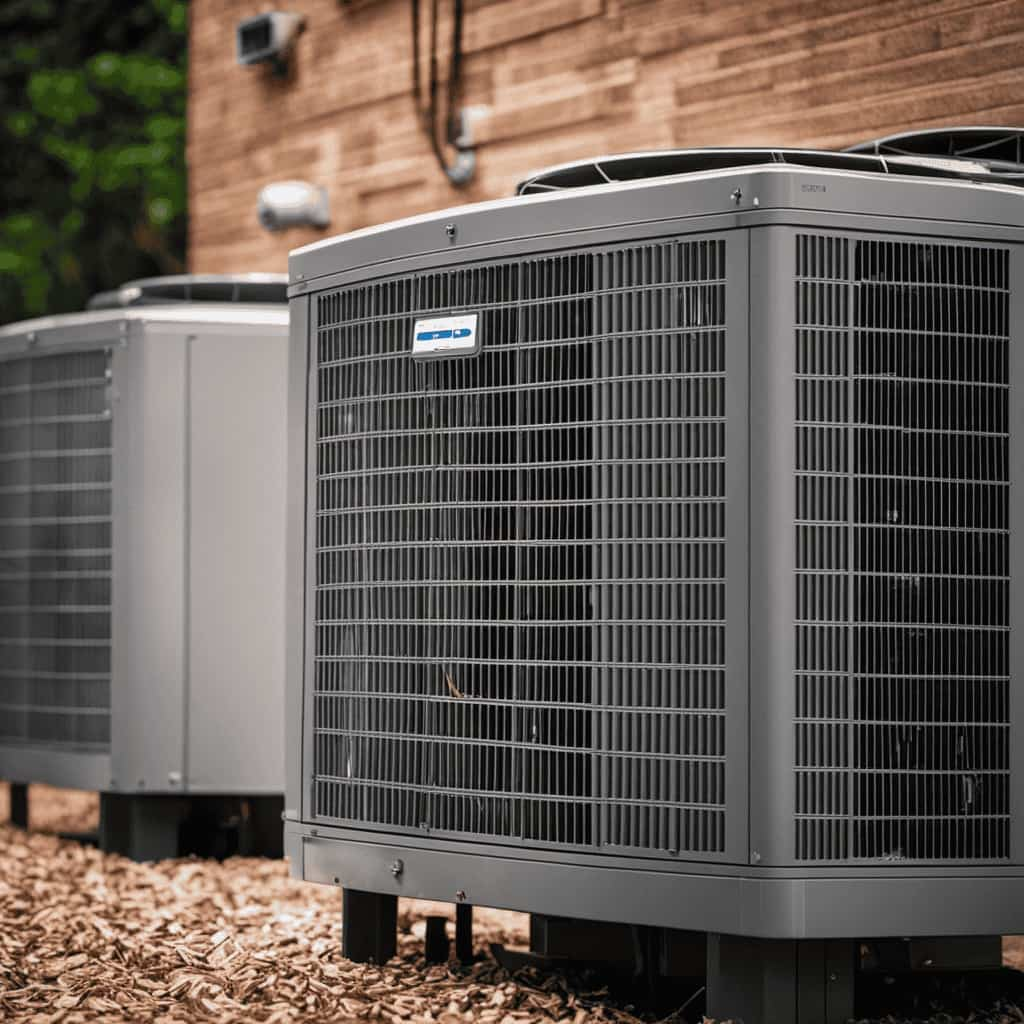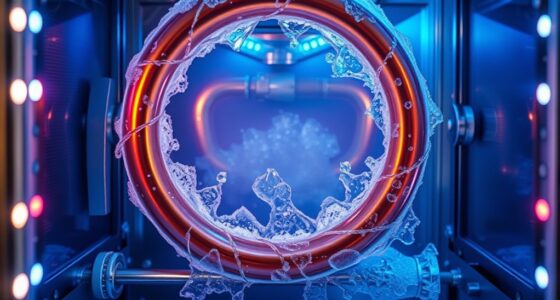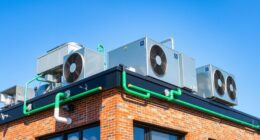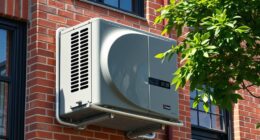Welcome to our guide on common issues with heat pumps.
We’re here to help you navigate the ins and outs of heat pump problems, like a trusted friend by your side.
Just imagine us as your heat pump whisperers, providing expert advice and troubleshooting tips.
From understanding the refrigeration cycle to fixing compressor and valve malfunctions, we’ve got you covered.

So sit back, relax, and let us be your go-to resource for all things heat pump related.
Key Takeaways
- The refrigeration cycle is crucial for troubleshooting heat pump issues.
- Identifying and repairing refrigerant leaks is essential for heat pump performance.
- Troubleshooting compressor issues is important for heat pump functioning.
- Resolving expansion valve problems ensures efficient heat pump operation.
Understanding the Refrigeration Cycle of a Heat Pump
Let’s dive into the ins and outs of the refrigeration cycle of a heat pump. Understanding this cycle is crucial for troubleshooting and resolving issues with your heat pump.
One important aspect of the cycle is the heat pump defrost cycle. During colder temperatures, the outdoor unit may accumulate frost or ice, hindering its efficiency. To combat this, the heat pump defrost cycle kicks in, melting the ice build-up.
This cycle is controlled by a heat pump defrost timer, which determines when the system should enter defrost mode. It carefully monitors factors like outdoor temperature and system run time to ensure efficient defrosting.

Now that we comprehend how the refrigeration cycle and defrost cycle work, let’s move on to the next section, where we’ll focus on identifying common refrigerant leaks in heat pumps.
Identifying Common Refrigerant Leaks in Heat Pumps
We can easily identify common refrigerant leaks in heat pumps by looking for signs such as reduced cooling or heating performance, hissing or bubbling sounds, or oil stains around the unit.
Refrigerant leaks can occur in various parts of the heat pump system, but one common area is the evaporator coil. The evaporator coil is responsible for absorbing heat from the indoor air, so any leaks in this component can significantly impact the performance of the heat pump.
To detect evaporator coil leaks, a technician will typically perform a visual inspection to check for oil stains or signs of refrigerant leakage. They may also use specialized equipment such as electronic leak detectors or UV dye to pinpoint the exact location of the leak.

Once the leak is identified, it can be repaired or the faulty component can be replaced to restore the heat pump’s efficiency.
Troubleshooting Issues With the Heat Pump Compressor
One common issue we may encounter is a noisy compressor. This can be caused by a faulty motor, loose components, or a refrigerant leak. If you notice a loud grinding or rattling noise coming from your heat pump compressor, it’s important to address the issue promptly.
First, check for loose screws, bolts, or panels and tighten them if necessary. If the noise persists, it could indicate a faulty motor. In this case, professional repair or replacement may be required.
Another issue you may face is when the heat pump compressor won’t start. This can be due to a malfunctioning thermostat, a blown fuse, or a problem with the electrical connections. It’s recommended to consult a qualified technician to diagnose and resolve the issue to ensure the proper functioning of your heat pump system.

Resolving Problems With the Expansion Valve in Heat Pumps
To resolve problems with the expansion valve in heat pumps, we can start by checking for any debris or blockages that may be affecting its performance. Here are some steps to take for expansion valve maintenance and potential replacement:
- Inspect the valve for any visible debris or blockages, ensuring that it’s clean and clear.
- Check the valve’s connections and seals for any signs of leaks, as this can impact its functionality.
- Evaluate the valve’s superheat setting to ensure it’s properly calibrated for optimal performance.
- If the expansion valve continues to malfunction despite these efforts, it may be necessary to consider a replacement.
Regular maintenance of the expansion valve is crucial to ensure efficient heat pump operation. However, if the valve is beyond repair, a professional should be consulted for expansion valve replacement.
Addressing Heat Pump Evaporator Coil Freezing
When it comes to heat pump evaporator coil freezing, there are several key points to consider.
First, understanding the causes of coil freezing is crucial in order to address the issue effectively.

Next, implementing preventive measures can help minimize the likelihood of coil freezing in the future.
Lastly, troubleshooting frozen coils requires a systematic approach to identify and resolve the root cause of the problem.
In the following sections, we’ll delve into each of these points in greater detail.
Causes of Coil Freezing
Our heat pump evaporator coil can freeze due to various factors. It’s important to understand these causes and take appropriate action to prevent coil freezing. Here are some common reasons why the coil might freeze:

-
Insufficient airflow: When there’s a restriction or blockage in the air ducts, it can lead to reduced airflow over the coil, resulting in frost buildup.
-
Low refrigerant levels: If the heat pump has a refrigerant leak or is undercharged, it can cause the coil temperature to drop below freezing point.
-
Thermostat issues: A malfunctioning thermostat can cause the heat pump to run continuously, leading to excessive cooling and eventual coil freezing.
-
Dirty air filters: Clogged filters can impede airflow, causing the coil to become excessively cold.

To prevent frost buildup and diagnose low refrigerant levels, it’s recommended to regularly clean or replace air filters, schedule professional maintenance, and promptly address any thermostat or airflow issues.
Preventing Coil Freezing
Regular maintenance of our heat pump’s evaporator coil is crucial for preventing coil freezing. One of the main causes of coil freezing is the buildup of condensation on the coil. This condensation can occur when the coil is not properly maintained and cleaned. To prevent condensation buildup, it is important to regularly clean the evaporator coil and remove any dirt or debris that may have accumulated. Additionally, maintaining proper air flow is essential for preventing coil freezing. This can be achieved by regularly changing the air filters and ensuring that there are no obstructions in the airflow. By following these maintenance practices, you can help prolong the life of your heat pump and prevent costly repairs.
| Preventing Coil Freezing | Tips |
|---|---|
| Clean the evaporator coil regularly | Remove dirt and debris |
| Change air filters regularly | Ensure proper air flow |
| Remove obstructions in airflow | Prevent coil freezing |
Troubleshooting Frozen Coils
Let’s address the issue of frozen coils in our heat pump’s evaporator coil and troubleshoot the problem. When your heat pump’s coils freeze, it can lead to reduced efficiency and even system failure. To help you address this issue, we’ve compiled a list of thawing techniques and maintenance tips:
-
Thawing techniques:

-
Turn off the heat pump and allow the coils to thaw naturally.
-
Use a hairdryer on low heat to gently thaw the frozen coils.
-
Place a fan near the coils to increase airflow and aid in the thawing process.
-
Consult a professional for advanced thawing techniques if necessary.

-
Maintenance tips:
-
Clean or replace dirty air filters regularly to ensure proper airflow.
-
Schedule regular maintenance checks with a professional to identify and fix any issues that could lead to coil freezing.
-
Insulate the outdoor unit and ensure proper drainage to prevent water accumulation around the coils.

-
Keep the area around the heat pump clear of debris to maintain optimal airflow.
Fixing Heat Pump Condenser Coil Problems
When diagnosing and resolving heat pump condenser coil problems, we need to consider a few key steps.
Proper heat pump condenser maintenance is crucial in preventing issues with the condenser coil. Regularly cleaning and inspecting the coil for dirt, debris, or damage can help maintain its efficiency and functionality.
Signs of a failing condenser coil include reduced cooling or heating performance, strange noises, and increased energy consumption. If these issues arise, the first step is to turn off the power to the heat pump. Then, carefully examine the coil for any visible damage or blockages.

Clearing debris and cleaning the coil with a soft brush and mild detergent can often resolve minor issues. However, if the coil is severely damaged or corroded, it may need to be replaced by a professional technician.
Troubleshooting Heat Pump Reversing Valve Malfunctions
To troubleshoot heat pump reversing valve malfunctions, we should start by checking for any signs of valve failure or blockages. This crucial component is responsible for changing the direction of refrigerant flow in the heat pump system. Here are some troubleshooting steps to help you identify and resolve issues with the reversing valve:
- Inspect the valve for physical damage, such as leaks or cracks.
- Check for any blockages or restrictions in the valve or associated pipes.
- Test the valve’s solenoid coil to ensure it’s functioning properly.
- Verify that the valve is receiving the correct voltage and signals from the control board.
If you’re experiencing issues with heat pump defrosting, it’s important to also consider the reversing valve. Malfunctions in this valve can affect the defrosting process, leading to decreased efficiency and performance.
Frequently Asked Questions
How Often Should I Schedule Maintenance for My Heat Pump?
We recommend scheduling maintenance for your heat pump at least once a year. Regular maintenance helps prevent issues and ensures optimal performance. Look out for signs of a malfunctioning heat pump, such as strange noises or reduced efficiency.

What Is the Average Lifespan of a Heat Pump?
The average lifespan of a heat pump depends on various factors such as regular heat pump maintenance and signs of heat pump failure. We can provide knowledge, technical assistance, and detailed guidance to serve you better.
Can I Use My Heat Pump During Extremely Cold Weather?
Yes, you can use your heat pump during extremely cold weather. However, it’s important to understand that using heat pumps in arctic climates can have effects on their performance due to the extreme cold.
How Can I Improve the Energy Efficiency of My Heat Pump?
To improve the energy efficiency of our heat pump, we can take several steps. By regularly cleaning and maintaining the system, checking for air leaks, and properly insulating our home, we can improve performance and reduce energy consumption.
What Is the Cost of Replacing a Heat Pump?
When it comes to the cost of replacing a heat pump, it depends on various factors such as the size, efficiency, and type of system. Heat pump installation and heat pump repair cost can vary, so it’s best to consult a professional for an accurate estimate.

Conclusion
In conclusion, understanding and addressing common heat pump issues is crucial for maintaining optimal performance and efficiency.
By recognizing the refrigeration cycle, identifying refrigerant leaks, troubleshooting compressor and expansion valve problems, addressing evaporator coil freezing, fixing condenser coil issues, and resolving reversing valve malfunctions, homeowners can ensure their heat pumps function effectively.
With proper knowledge and maintenance, heat pumps can provide reliable heating and cooling solutions for years to come.









